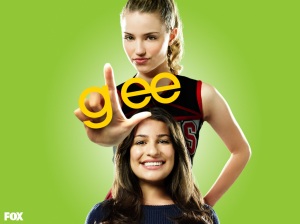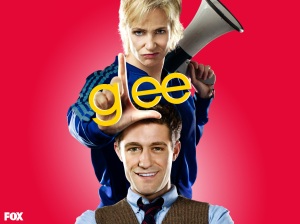As there won’t be a new One Piece omnibus for a while, I’ll have to obsessively geek out over something else. Fortunately, I have the Glee DVD set in my possession. For those of you who don’t know, it’s a comedy-drama-musical about a high-school show choir that airs on Fox, and it was created by Ryan Murphy, who has experience with surreal high-school comedy-drama from his work on Popular. (He also created Nip/Tuck, but I’ve never watched it, because plastic surgery grosses me out and some of my worst nightmares have featured scalpels.)
I loved about half of Popular (the surreal, bitchy parts) and couldn’t have cared less about the rest (angst-y teen drama). My enjoyment ratio is better with Glee, and I tend to enjoy the grounded drama as much as the heightened, bizarre material. As with Popular, I strongly suspect that Murphy can’t bring himself to really dislike bitchy, status-conscious blondes, though he pays lip service to the notion that perhaps we all should hold them in contempt.
 The blonds on Popular got all of the good lines and funny scenes and, as a result, they were more effective when they were thrust into mope-y drama sequences. The brunettes fare better on Glee than their Popular sisters did, since they’re also quirky and funny, particularly stardom-obsessed Rachel Berry, played by Lea Michele of Spring Awakening fame. In addition to having a perfect Broadway belt, Michele is endearingly shameless. Rachel is narcissistic and bossy, but she’s also a self-defeating goof, and she’s got a good heart somewhere under all that ambition.
The blonds on Popular got all of the good lines and funny scenes and, as a result, they were more effective when they were thrust into mope-y drama sequences. The brunettes fare better on Glee than their Popular sisters did, since they’re also quirky and funny, particularly stardom-obsessed Rachel Berry, played by Lea Michele of Spring Awakening fame. In addition to having a perfect Broadway belt, Michele is endearingly shameless. Rachel is narcissistic and bossy, but she’s also a self-defeating goof, and she’s got a good heart somewhere under all that ambition.
I was talking about my fondness for Rachel’s foil, pretty cheerleader Quinn Fabray, on Twitter yesterday, and puritybrown summed up Quinn’s vibe nicely as “tell me to hate her and I won’t.” Quinn, played by Dianna Agron, joins the glee club at the behest of psychotic cheerleading coach Sue Sylvester (played perfectly by Jane Lynch). As you might suspect, Quinn grows to like being in glee club more than her high-maintenance cheerleading career and presidency of the Celibacy Club. Participating in show choir also allows her to keep an eye on her dim, quarterback boyfriend Finn Hudson, played by Cory Monteith. Quinn knows that Rachel has a thing for Finn, and she suspects that Finn may return the feelings. Finn’s a nice moron, and he wants to do what’s right to both girls, especially after Quinn discovers that she’s pregnant.
The pregnancy plot should dump Quinn firmly in the villainess category, and she’s undeniably manipulative and deceitful, but at least her feelings for Finn seems genuine. This puts her miles ahead of Terri Schuester, played by Jessalyn Gilsig, who fakes a pregnancy to hold onto her husband, Will, the advisor of the glee club, played by Matthew Morrison. Unlike Quinn, Terri’s manipulations seem based entirely on a desire to possess something she doesn’t even particularly like. Terri is like a real estate speculator who bought a parcel of land under the impression that it would increase in value. It didn’t, and she’s too stubborn and lazy to sell it at a loss and reinvest in something more promising. Gilsig seems like she could be funny, but she’s not menacing enough for this role, or she’s insufficiently shameless to really let the audience gape in horror at her character. (She should watch more of Michele’s and Lynch’s scenes.)
 Another part of the problem is Will and Morrison’s portrayal of him. He’s supposed to be an inspiring teacher, but he’s too prone to letting his ambitions get in the way of the best interests of the club. There’s also something irritating about Morrison’s mannerisms; his grins, both elfin and sheepish, make me curl my hands into fists, and his attempts at boyish sincerity are similarly grating. It’s always irritating to see women fighting over a loser, a la Betty and Veronica, and it’s particularly irksome when one of those women is Emma Pillsbury, the decent, obsessive-compulsive guidance counselor winningly played by Jayma Mays. (At one point, she tells Terri that Will deserves better than Terri, ignoring the fact that Emma deserves better than Will.)
Another part of the problem is Will and Morrison’s portrayal of him. He’s supposed to be an inspiring teacher, but he’s too prone to letting his ambitions get in the way of the best interests of the club. There’s also something irritating about Morrison’s mannerisms; his grins, both elfin and sheepish, make me curl my hands into fists, and his attempts at boyish sincerity are similarly grating. It’s always irritating to see women fighting over a loser, a la Betty and Veronica, and it’s particularly irksome when one of those women is Emma Pillsbury, the decent, obsessive-compulsive guidance counselor winningly played by Jayma Mays. (At one point, she tells Terri that Will deserves better than Terri, ignoring the fact that Emma deserves better than Will.)
It’s not surprising to me that the adults gradually receded as the season progressed. After “Acafellas,” an episode where Will forms a middle-aged boy band, I couldn’t imagine them ever giving him the full weight of an episode again. The kids are just funnier and more interesting, and when they make stupid mistakes, it’s easier to sympathize with them because… well… they’re kids. Quinn can seem kind of heartbreaking in the midst of her schemes, but Terri just seems pathetic. (I’d love to see a scene where Quinn realizes that she could turn into Terri if she’s not careful.)
And the music is great. Sometimes the mere fact that the club is singing a particular song can make me grin like an idiot, and that’s before I get the chance to fully appreciate how well they’re performing it. (It’s not a criticism to note that a rival school’s performance of “Rehab” in the first episode sets the bar; the club is supposed to be leagues above our stars, and just about every big number is terrific.)
